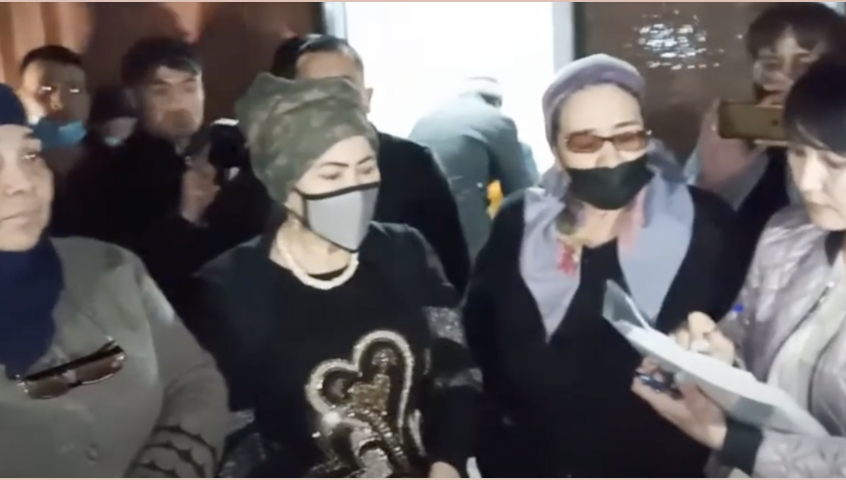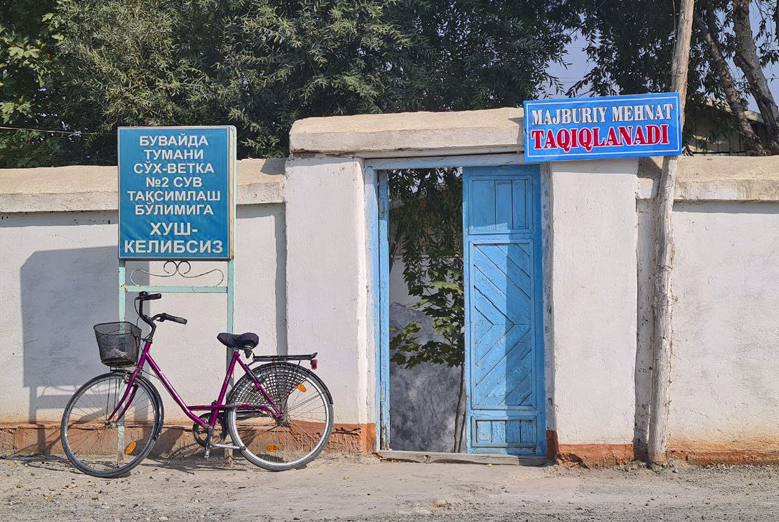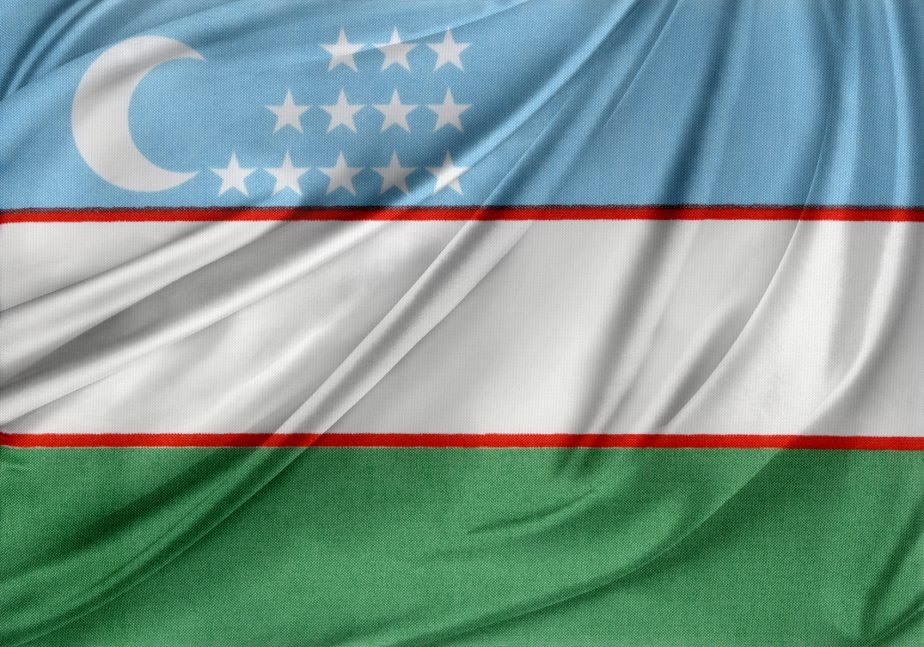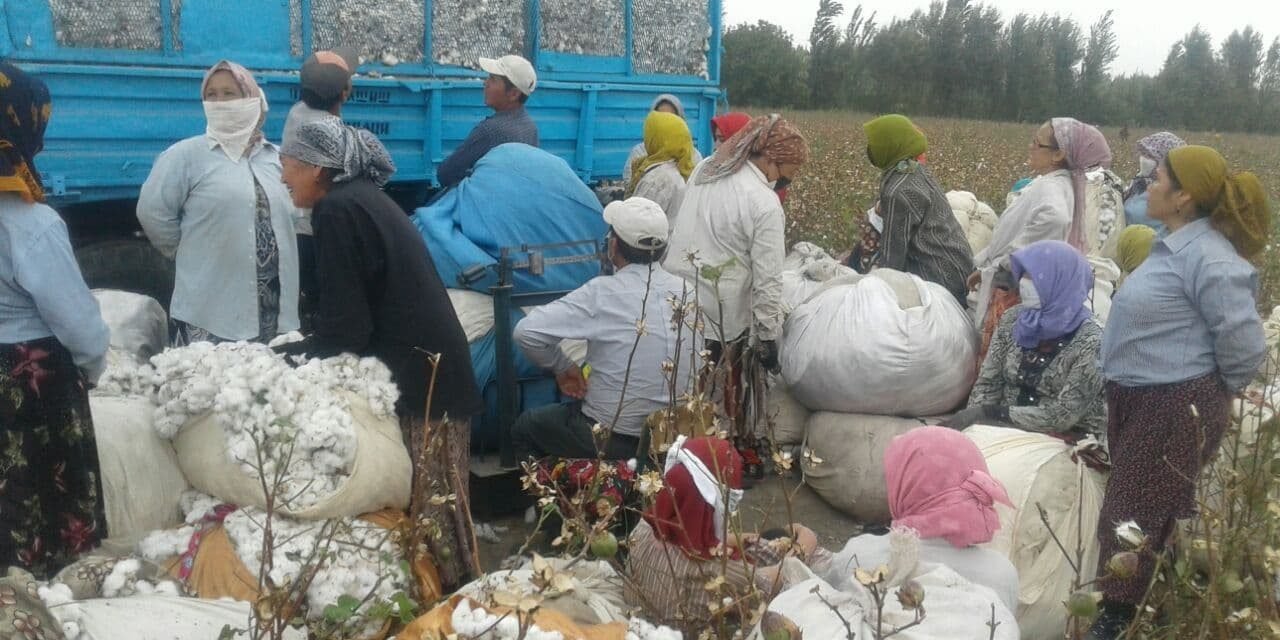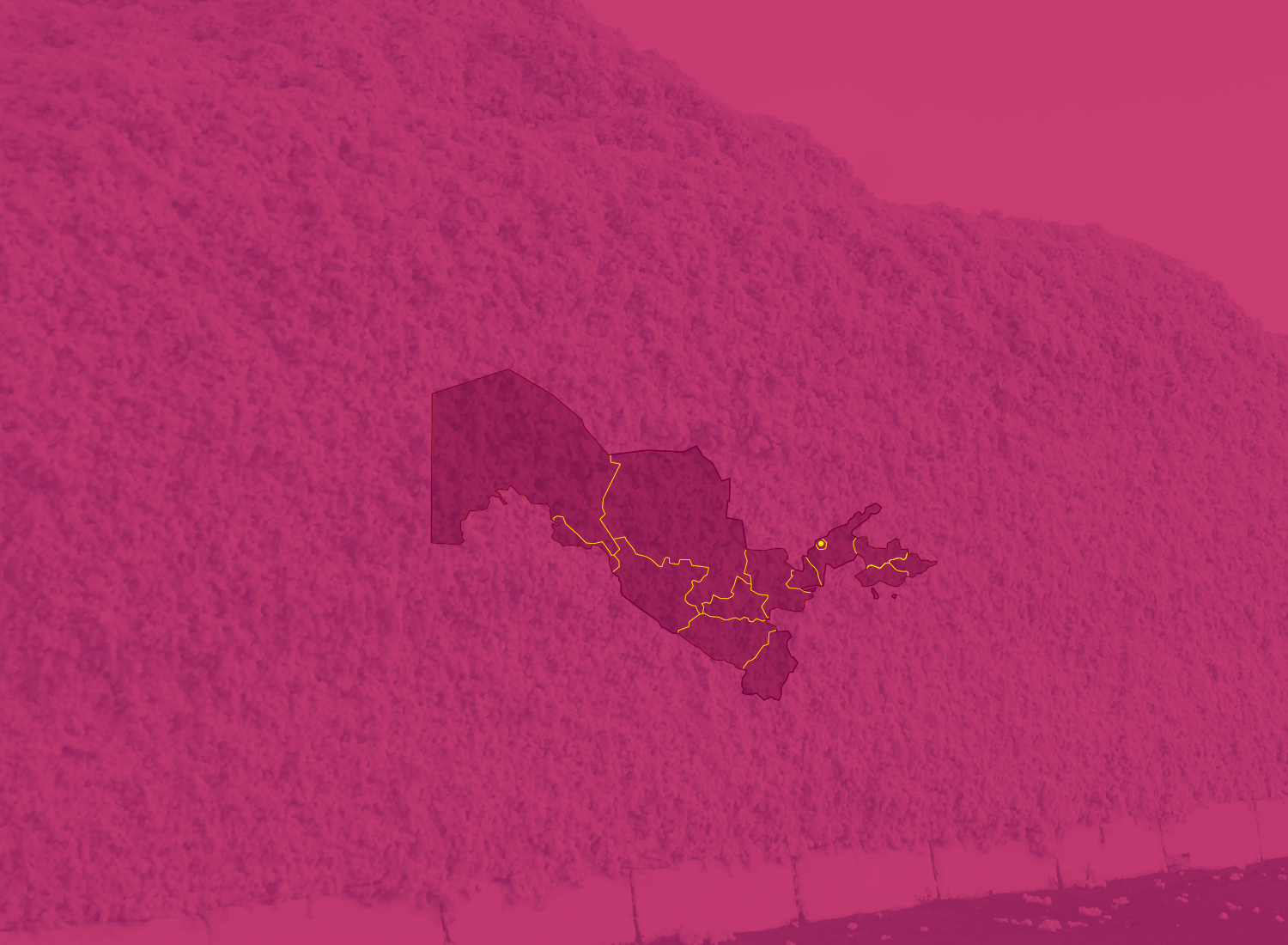
Consolidating Reforms to End Forced Labor and Promoting Responsible Sourcing From Uzbekistan
In 2017, after more than a decade of international pressure from the Cotton Campaign, the Uzbek Government acknowledged the forced labor problem and has since undertaken steps to enact systemic reforms.
In 2020, for the first time, findings of independent civil society monitoring showed that in some districts in Uzbekistan, cotton was harvested without forced labor. Despite these gains, the civic space remains constrained and arbitrarily restricted, which puts the reforms to end forced labor at risk.
While the Uzbek Government’s strong political commitment to end forced labor is clear and unequivocal, broader reforms towards an enabling environment for labor rights lag far behind economic reforms in the sector.
The Cotton Campaign remains focused on implementing a human rights agenda in Uzbekistan and supporting Uzbek human rights defenders in their efforts to widen space for civic participation, strengthen the protection of freedom of association and expression, and encourage responsible sourcing of cotton products from Uzbekistan.
Key moments in the Cotton Campaign’s work to end forced labor in Uzbekistan
When the Cotton Campaign launched in 2007, the Uzbek Government was forcing over one million children to pick cotton every fall. Adults, including medical staff, teachers, doctors, public sector employees and students were also sent to the fields under the threat of penalty, leaving critical public services understaffed.
In 2009, Uzbek civil society activists launched a petition calling for a boycott of Uzbek cotton to raise awareness of the scale and impact of the abuses. Several brands had already banned forced labor and Uzbek cotton in their supply chains. Many others joined following the call by civil society. The Cotton Campaign consolidated these efforts by launching the Uzbek Cotton Pledge.
By signing it, brands and retailers publicly committed to not use Uzbek cotton in their products as long as it is produced with state-orchestrated forced labor. Today, the Pledge has over 300 signatories. The Pledge has been critical to the success of our work.
Under pressure from the boycott and the Cotton Campaign’s accountability actions, the Uzbek Government stopped forcing children to pick cotton by 2014. However, it continued to deny the forced labor problem and attempted to prevent reporting. Children were no longer forced to pick cotton, but adult forced labor intensified. The arrests and retaliation against labor rights defenders escalated in 2015.
In addition to the Pledge, the Cotton Campaign used a wide range of policy, legal, and campaigning tools to push for reform in Uzbekistan. These include
Independent monitoring of the annual cotton harvest in Uzbekistan by Cotton Campaign’s core frontline partner Uzbek Forum for Human Rights (Uzbek Forum);
Human rights advocacy with governments, international financial institutions, and global brands and retailers;
Accountability actions against the Uzbek Government, including promptly reporting in the international arena on cases of arbitrary detention, threats, and degrading ill-treatment against human rights activists and independent labor monitors; and
Advocacy with the Government of Uzbekistan to engage constructively in Uzbekistan’s reform process.
In 2017, the Government of Uzbekistan embarked on a major economic reform program to privatize the cotton industry and expand the manufacturing sector. Supplier textile companies (known as “clusters”) control all aspects of production, from cotton growing and harvesting, through to various stages of value-added processing, up to manufacturing of finished goods.
With its primary focus on economic reforms and supply chain integration, the Uzbek transformation process has not sufficiently emphasized the need to empower civil society and develop effective institutions for transparency and accountability in the cotton sector.
The Cotton Campaign calls on the Uzbek Government to introduce broader reforms to empower civil society, protect freedom of association and promote responsible sourcing.
Our work is not yet finished
-
With its primary focus on economic reforms and supply chain integration, the Uzbek transformation process has not sufficiently emphasized the need to empower civil society and develop effective institutions for transparency and accountability in the cotton sector.
Broader reforms to empower civil society lag far behind economic reforms in the sector. Cotton workers and farmers have no independent trade unions, organizations, or associations to represent them and defend their rights.
Their freedom of association and expression remains severely constrained, with many independent labor and human rights NGOs facing challenges to register and monitor the human rights situation in their country.
-
Obstacles to NGO registration: Authorities continue to impose excessive and burdensome registration requirements on independent NGOs in violation of their freedom of association. Uzbek authorities have repeatedly and arbitrarily denied registration to nearly all independent human rights NGOs, including those that monitor forced labor.
No independent unions: Although Uzbekistan has ratified ILO Convention 87 on Freedom of Association, it has made little progress on meaningful implementation. Farmers, farm workers, and cotton pickers are vulnerable to abuses by cotton companies (known as “clusters”) as well as local officials and are not represented by independent labor unions or other representative organizations.
-
Beginning in 2019, the swift privatization of Uzbekistan’s cotton sector has facilitated a grand scale transfer of hundreds of thousands of hectares of farmers’ land to private operators (known as cotton “clusters”). These clusters are private, vertically integrated enterprises that combine the production of raw cotton, processing and manufacture of yarn or textiles.
Farms that are not being operated directly by private companies (direct farming) are now under contract to grow cotton for them (contract farming). In general, only one cluster operates in each district of Uzbekistan’s 13 regions, which has created a monopoly situation in which farmers have no choice over whom they can produce cotton for, leaving them vulnerable to exploitative practices.
Uzbek Forum’s monitoring findings of the 2020 and 2021 cotton harvests confirmed that abusive clusters impose below-market prices for cotton, unrealistic production targets, inflated costs for inputs such as fuel and fertilizers and fail to pay for delivered cotton, leaving many farmers in crippling debt. Farmers told Uzbek Forum during the 2021 harvest they still had not received payment for cotton they delivered in 2020.
Uzbek Civil Society at the Core of the Cotton Campaign
The Cotton Campaign’s success would have not been possible without Uzbek civil society - brave human rights activists and labor monitors who never stopped calling for an end to forced labor and documented abuses despite harsh retaliation by the Uzbek Government, including arbitrary detention, intimidation, and violence.
In 2009, Uzbek civil society activists launched a petition [link] calling on international stakeholders to boycott forced labor Uzbek cotton.
“It is our role, as Uzbek human rights activists, to lobby the international community and use outside pressure to bring about change. In authoritarian Uzbekistan, it is extremely difficult to resist from within the country, especially as there are no mechanisms that can be used by citizens to defend themselves from the arbitrary decisions of the state. External pressure seems to be the only way to compel the authorities to give up this practice of forced labor. ”
Elena Urlaeva, a long-time human rights and civic activist was arrested in 2015 at least six times in retaliation for reporting on forced labor.
Reforms to End Forced Labor at Risk
Broader reforms to empower civil society are urgently needed in Uzbekistan.
Cotton workers, farmers, and the broader civil society must be able to advocate for decent working conditions and report independently and transparently on problems, both individually and collectively.
Yet in Uzbekistan, cotton workers have no independent organizations or trade unions to voice concerns and defend their rights. Their freedom of association and expression remains severely constrained, with many independent labor and human rights NGOs facing challenges to register and monitor the human rights situation in their country
Without freedom of association and the ability of workers and activists to advocate for their own working conditions, there is a real risk that the economic reforms in the cotton sector will create an environment prone to labor exploitation.
Ensuring the Reforms to End Forced Labor are Irreversible Recommendations to Stakeholders
-
The Government of Uzbekistan should recognize that:
Freedom of association and freedom of expression are fundamental human rights and are critical to the long-term success of efforts to eradicate forced and child labor and promote decent work in the cotton and textile sector.
A robust, independent civil society is critical for the durability of the reforms to end state-imposed forced labor in cotton production.
The global brands and retailers that are looking to source from Uzbekistan require strong assurances that the reforms to eradicate forced labor are irreversible.
In accordance with their legal and human rights due diligence obligations, brands need to ensure they can identify, prevent, and mitigate any risks of forced labor at all levels of the Uzbek textile value chain. This requires credible mechanisms for independent monitoring and accountability, and the development of effective institutions to provide transparency at the industry level. Independent NGOs, independent journalists and independent trade unions play a key role in developing and operating such mechanisms and institutions.
-
The Government should take the following actions:
Introduce broader reforms to empower civil society and develop effective institutions to provide transparency and accountability across all aspects of the cotton sector.
Take steps to ensure that textile clusters uphold international labor standards across all stages of production, including by allowing labor rights organizations to conduct labor rights training with their employees.
Do not obstruct workers or employers, including farmers, from creating independent representative organizations and unions.
Ratify the ILO Minimum Wage Fixing Convention (No. 131) and take steps to set a minimum wage that reflects the minimum income necessary for a cotton worker at all stages of production to meet the basic needs of herself and her family, including some discretionary income.
Develop and enact human rights due diligence (HRDD) legislation.
In particular, the Ministry of Justice should:
Permit the speedy and straightforward registration of independent human and labor rights NGOs in the country, including by allowing them to correct any minor or non-substantive errors in their applications, such as orthographical and formatting errors, rather than rejecting them.
In particular, the Ministry of Labor and Employment should:
Engage constructively with international and domestic independent human and labor rights NGOs, the Cotton Campaign, and the ILO, to implement ILO Convention 87 on Freedom of Association and the Protection of the Right to Organize and ILO Convention 98 on Right to Organize and Collective Bargaining.
Train labor inspectors on international labor standards and best practices for implementation.
Strengthen its engagement with the Cotton Campaign in the areas of labor inspections, capacity building on international labor standards, monitoring the implementation of international labor standards at cotton farms and clusters, and worker empowerment, to ensure decent work in the cotton sector.
In particular, the Ministry of Agriculture should:
Take steps to ensure transparency and fairness in land allocation and prevent arbitrary land confiscation.
Take steps to ensure meaningful consultation of farmers in the process of setting the price that cotton clusters pay for raw cotton.
Publicly support the farmers’ efforts to create an independent Association that reflects and protects their interests.
The Cotton Campaign urges all international stakeholders to reinforce these recommendations in their engagement with the Government of Uzbekistan.
-
Commit to fair recruitment practices for workers at all levels of the supply chain - including cotton pickers and workers in the production facilities - in accordance with the ILO General principles and operational guidelines for fair recruitment and definition of recruitment fees and related costs. This means ensuring that prospective workers receive correct information on their working and living conditions; that workers are not asked to make advance payments; and that workers are formally registered at the relevant administrative authorities.
Provide all workers with written employment contracts and monthly payslips in a format that workers can understand.
Pay all categories of workers, from apprentices to skilled workers, a wage that enables them to cover their basic needs and have a discretionary income.
Facilitate the establishment and functioning of democratically elected, independent, farm-level and factory-level trade unions and worker organizations. Engage in good faith dialogue with these unions and organizations with a view to producing collective bargaining agreements that are respected and implemented, and regularly renegotiated as per the law.
Ensure that international labor standards are upheld across all stages of production. To this end, allow labor rights organizations to conduct labor rights training with employees and management.
Engage in good faith with the Cotton Campaign and the international brands and retailers that are looking to begin sourcing from Uzbekistan, with a view to work together to align workplace practices to international labor standards.
-
All brands and retailers should:
Map out their supply chains and identify where and how Uzbek cotton enters their supply chains.
Brands and retailers should require that all suppliers, sub-suppliers, and business partners in their whole supply chains exercise human rights due diligence in all aspects of their interaction with the Uzbek textile industry, from evaluating its commercial attractiveness to establishing and maintaining commercial relationships with Uzbek clusters.
Publicly disclose subsidiaries, suppliers, sub-suppliers and business partners in their whole supply chains.
-
In particular, the brands and retailers looking to source from Uzbekistan, should:
Assess whether sourcing Uzbek cotton goods meets their human and labor rights commitments and legal obligations to not use forced and exploitative labor in their supply chains.
Each company looking to source from Uzbekistan must evaluate whether it has the means and capacity to effectively implement human rights due diligence and mitigate human rights risks in its Uzbek supply chain.
Exercise human rights due diligence in all aspects of their interaction with the Uzbek textile industry, from evaluating its commercial attractiveness to establishing and maintaining commercial relationships with Uzbek clusters.
The vertical integration of the Uzbek supply chain requires brands to conduct human rights due diligence to identify, prevent, mitigate, and account for adverse human rights impacts at all levels of production, including the cotton farms controlled by the supplier clusters, their spinners, fabric mills, and cut-make-trim units.
Actively commit to furthering freedom of association and collective bargaining. Facilitate the establishment and functioning of democratically elected, independent, farm and factory-level trade unions and worker organizations.
Adhere to responsible purchasing practices that enable those involved in all tiers of the supply chain to be decent employers, offer employment contracts, and pay a living wage to their workers.
Fair purchasing practices include:
Fair contractual terms;
Fair prices based on fair and ‘open costing’;
Mutual agreement between buyer and supplier on production planning and lead times;
Reasonable payment terms (60 days);
No unilateral suspension of cancellation of contracts;
Transparency about purchasing practices and costing methodologies. Contracts between buyer and supplier should not contain clauses that deny parties the right to publicly disclose such information.
EU Directive on business-to-business relationships in the agricultural and food supply chain (2019), bans the following ten Unfair Trading Practices:
Payment later than 30 days for perishable agricultural and food products;
Payment later than 60 days for other agri-food products;
Short-notice cancellations of perishable agri-food products;
Unilateral contract changes by the buyer;
Payments not related to a sale of agricultural and food products;
Risk of loss and deterioration transferred to the supplier;
Refusal of a written confirmation of a supply agreement by the buyer, despite request of the supplier;
Misuse of trade secrets by the buyer;
Commercial retaliation by the buyer;
Transferring the costs of examining customer complaints to the supplier.
Ensure that the clusters they work with (the suppliers) do not exploit farmers by requesting them to sign blank contracts, provide late payments, or go back on initially agreed terms.
Publicly support the farmers’ efforts to create an independent Association that reflects and protects their interests.
Engage in good faith with the Cotton Campaign and explore the possibility of sourcing through the Cotton Campaign Framework for Responsible Sourcing. The Framework was designed to ensure that brands can begin sourcing from Uzbekistan in a manner consistent with their human rights due diligence requirements and legal obligations.
Key elements of the Framework include:
A co-governed Board with equal representation of brands, labor, and textile clusters
Implementation of ILO standards at all levels of the textile supply chain
Independent grievance mechanism and access to effective remedy
Independent and ongoing monitoring
Accountability at both supplier & buyer levels
Capacity building and contributing to an enabling environment for labor rights, including freedom of association
Cotton Campaign Roadmap of Reforms for Uzbekistan
-
This Roadmap was presented by the Cotton Campaign to the Government of Uzbekistan in June 2019 and was received positively. The Roadmap sets forth a comprehensive vision to end forced labor in the cotton industry and ensure that reforms are lasting and sustainable.
-
The Roadmap builds on three (strategic) pillars:
1) ending systemic forced labor,
2) enacting structural reforms and
3) empowering civil society.
These pillars are complementary and mutually reinforcing: systemic forced labor cannot be eliminated without the enactment of structural reforms; neither can be achieved without the empowerment of civil society to ensure transparency and accountability across every aspect of the reform process.
-
The Cotton Campaign urges all international stakeholders to use this Roadmap as the basis for their engagement with the Uzbek Government and cotton textile companies in the country to ensure that reforms to end forced labor are robust and sustainable.
Constraints on Freedom of Association: Adolat Sari Olg’a (Onward to Justice), the first independent trade union in Uzbekistan, which formed democratically in March 2021 at a textile cluster, faced intimidation and could not register as an independent union.
Obstacles to NGO Registration: Akbaskur (formerly called Chiroq), an independent labor rights NGO aiming to monitor the annual cotton harvest and defend human rights, was denied registration two times. In November 2021, Akbaskur submitted its third registration application.
Cotton Campaign Framework for Responsible Sourcing from Uzbekistan
As Uzbekistan seeks to establish itself in the global market, international brands, local suppliers, and labor have the unique chance to work together to set high standards for the emerging industry.
The Cotton Campaign encourages responsible sourcing of yarn and cotton products from Uzbekistan and it developed a Framework for Responsible Sourcing to support brands in conducting their human rights due diligence. The Framework offers brands the opportunity to work collaboratively with the Uzbek textile industry to establish and maintain strong practices and make Uzbekistan a key sourcing country for sustainable cotton and textiles.
As brands begin sourcing from Uzbekistan, they must do so responsibly.
Brands must exercise human rights due diligence in all aspects of their interactions with the Uzbek textile industry, from evaluating its commercial attractiveness to establishing and maintaining commercial relationships with Uzbek clusters.
The vertical integration of the Uzbek supply chain requires brands to conduct human rights due diligence to identify, prevent, mitigate, and account for adverse human rights impacts at all levels of production, including the cotton farms controlled by the supplier clusters, their spinners, fabric mills, and cut-make-trim units.
Achieving this as an individual company, in an industry with significant human rights risks, can be challenging. For this reason, the Cotton Campaign developed a Framework for Responsible Sourcing for brands, suppliers, and labor groups to work collaboratively and at scale to establish and maintain strong standards in the emerging Uzbek textile industry.
-
The Framework for Responsible Sourcing provides the critical elements to ensure adherence to international labor standards, without which the Cotton Campaign urges buyers not to source from high-risk countries, like Uzbekistan.
These elements include:
Traceability of the cotton from the field through to yarn, textile, and finished goods
It provides a level playing field by creating a pool of responsible buyers and a pool of responsible suppliers
A co-governed Board with equal representation of brands, labor, and textile clusters
Implementation of ILO standards at all levels of the textile supply chain
Independent grievance mechanism and access to effective remedy
Independent and ongoing monitoring
Accountability at both supplier & buyer levels
Capacity building and contributing to an enabling environment for labor rights, including freedom of association
Signatories contribute to promoting strong industry standards and a collaborative approach
-
The Cotton Campaign Responsible Sourcing model is based on the key elements of effective human rights due diligence: a risk-based approach to identifying and addressing human rights impacts, meaningful engagement with affected stakeholders, access to effective remedy, and responsible sourcing practices.
There is increasing evidence that social audits are not fit for the purpose of identifying labor rights abuses at all levels of the supply chain, and in particular in environments with a high risk of forced labor. The Cotton Campaign discourages brands and retailers from using social audits as a risk-mitigation strategy.
In practice, the Cotton Campaign model is different from social audits in that:
It entails the establishment of a grievance mechanism that provides effective remedy at all levels of the supply chain, in accordance with the criteria for non-judicial grievance mechanisms established by the UNGPs: legitimacy, accessibility, predictability, equitability, transparency, rights-compatibility, and consultation with affected stakeholders
It entails comprehensive, ongoing, and on-site monitoring of the implementation of international Labor Standards, as opposed to annual/bi-annual surveys conducted by auditors
The funding model for the Responsible Sourcing Framework considers all actors of the supply chain, as opposed to the audit model, where the suppliers are expected to pay the full costs of social audits
The Uzbek Cotton Pledge
In 2010, the Cotton Campaign and its partner Responsible Sourcing Network (RSN) launched the Company Pledge Against Forced Labor in the Cotton Sector of Uzbekistan. By signing it, brands and retailers publicly committed to not use Uzbek cotton in their products as long as it is produced with state-orchestrated forced labor.
The Pledge uses standardized language building on the companies’ own human and labor rights commitments and legal obligations to not use forced labor in the production of their products. By 2021, the Pledge reached over 320 signatory brands.
News
Resources





